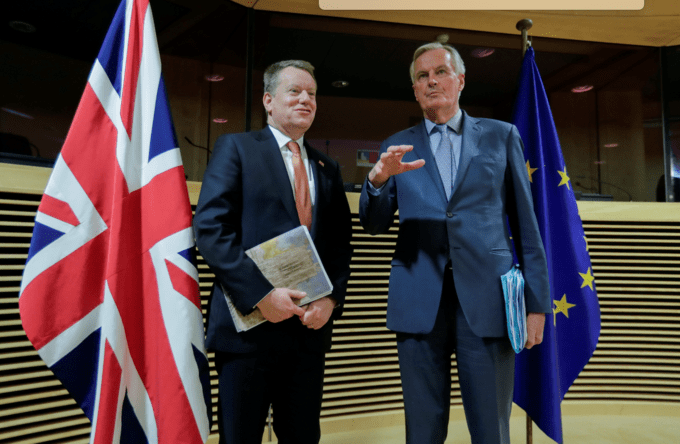What’s in the Brexit deal between the European Union and the United Kingdom?
The EU-UK Trade and Cooperation Agreement was negotiated in nine months—much faster than the typical trade deal—and respects the major red lines of both parties. The EU avoids a hard border on the island of Ireland and preserves the “four freedoms” of its cherished single market: free movement of goods, services, capital, and people.
The UK achieves “zero tariff, zero quota” goods trade with its main trading partner and avoids any role for the European Court of Justice in settling trade disputes. On fisheries, the EU agreed to give up 25 percent of its existing quotas in UK waters over a transition period of five and a half years, after which there will be annual renegotiations.
The main sticking point—how to guarantee a level playing field in future trade relations—was resolved by the principle of “managed divergence.” That means both sides reserve the right to retaliate, after a judicial review process, if they believe the other side has gained an unfair competitive advantage.
What does it mean for the future of UK trade with the EU?
Beginning in January, trade in goods will become a lot more burdensome, since the UK will formally have left the EU customs union and single market. Although there will not be any tariffs levied or restrictive quotas imposed, there will be a whole series of new customs and regulatory checks, including rules of origin and stringent local content requirements.
This will add red tape, slowing down the overall process, and just-in-time supply chains will take a while to adjust to the new reality. Even more important, however, is the likely negative effect on trade in services, where the UK has a comparative advantage, since there will no longer be automatic recognition of professional qualifications and licenses. Services make up close to 80 percent of the UK economy.
There will also be an end to freedom of movement and the reintroduction of temporary visas for work-related purposes. Some sectors, including in financial services and energy, are subject to future regulatory decisions, adding to uncertainty.
Does this pave the way for a U.S.-UK trade deal?
In principle, yes. Although the incoming Joe Biden administration has made it clear that new trade deals are not a priority, a U.S.-UK deal is an important prize for many Conservative lawmakers in Westminster.
Such a deal should theoretically be doable by 2023, but it remains doubtful whether it would have enough domestic support in the UK. After all, Washington will want London to open up its markets for agricultural goods, pharmaceuticals, and financial services, and it is not clear that the UK would have all that much to gain from doing so. Nothing excites the British tabloids more than reports of chlorine-washed chickens and genetically modified organisms (GMOs) wiping out British farmers and of the UK’s National Health Service (NHS) being forced to buy American prescription drugs.
The United States will also want to prioritize its trade relationship with the EU and come up with a joint strategy to deal with a rising China, which could complicate the U.S.-UK negotiations.
What could the deal mean for the Northern Ireland border, or for the broader territorial integrity of the United Kingdom?
It’s good news for the border, as customs checks will take place in the Irish Sea rather than on the land border between Northern Ireland and the Republic of Ireland. But this means that Northern Ireland de facto remains within the EU regulatory orbit and will over time diverge from the rest of the UK. One telling example: the Republic of Ireland has promised to finance the Erasmus exchange program for Northern Irish students after the UK leaves the program on January 1.
Just as Northern Ireland will over time move closer to the Republic of Ireland, making future reunification conceivable, so the dream of Scottish independence remains alive. With 62 percent of Scots voting to remain in the EU in 2016, the hope of Nicola Sturgeon’s Scottish National Party (SNP) has been to regain its absolute majority in the Scottish Parliament during regional elections in May 2021 and then hold another independence referendum shortly after that. Over the last year or so, opinion polls in Scotland have shown a solid majority in favor of independence, with large numbers of younger voters overwhelmingly in favor.
Will the conclusion of this drama have any impact on other populist or Euroskeptic movements around the EU?
From Brussels’s point of view, this deal has done something important by showing that leaving the EU is not easy. The process has laid bare the real trade-offs between regaining sovereignty (“taking back control”) on the one hand and reaping the economic benefits of being a member of the single market on the other.
It is important to note that Euroskeptic parties in other EU countries often do well for different reasons than do pro-Brexit forces in the UK, which was neither a member of the eurozone common currency area nor part of the Schengen passport-free zone. It is hard to imagine eurozone members leaving the EU, as the economic damage would be too bruising. Other non-eurozone EU members, such as Hungary and Poland, receive huge financial benefits from the EU, and their citizens strongly support membership. That said, although the end of the Brexit saga comes as a huge sigh of relief for Brussels, the EU is not without its own problems, and Euroskepticism is unlikely to go away any time soon.
In the UK, meanwhile, it will now be harder to blame the EU when things go awry. But the Christmas Eve agreement is not the end of the story, it is a living document that will need to be revisited in the future, leaving plenty of room for anti-EU sentiment to outlast Brexit.






